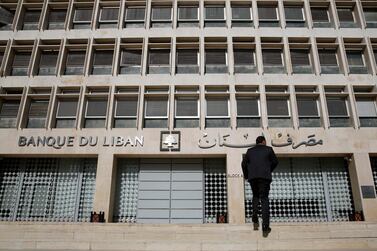Lebanon has just formed a government after more than eight months of political wrangling over posts in the 30-member cabinet. But there is little time to rejoice: the country faces economic and social challenges that will test the new government's will to reform.
The first order of business for Prime Minister Saad Hariri’s third government is to agree on a policy statement outlining its priorities. The cabinet will hold its first meeting on Saturday to form a ministerial committee to discuss the matter, with representation from all the major groups.
This is the first arena where divisions between the new ministers must be reconciled, and the committee will have one month to do so. Pro-Damascus parties, including Iran-backed Hezbollah and the Free Patriotic Movement, are looking to normalise Beirut’s ties with Syria, frozen since the outbreak of the Syrian crisis in 2011.
Mr Hariri and his allies in the Lebanese Forces party and the Progressive Socialist Party have called for a political settlement to the Syrian crisis before such a move is made. But pressure in both Lebanon and the region is mounting on the matter.
Mohammad Fneish, the Hezbollah-affiliated youth and sports minister, told The National that it was still too early to foresee whether the issue would become a sticking point. He said there were many other local matters of "utmost importance": the economic and financial situation, social issues and the environment.
He also warned against attempts to raise the issue of Hezbollah’s arms in the policy statement, a sticking point that has cropped up regularly at this stage. “If we want to open this discussion from the beginning, we will be throwing a stick into the wheel of cabinet from the get-go.”
The delicate issue has previously been addressed by reaffirming the rights of Lebanese to resist Israel, while calling for Lebanon to stay out of regional conflicts – but some parties want more direct language that calls for the state to be the only legitimate bearer of arms. Samir Geagea, the Lebanese Forces leader opposed to Hezbollah’s arsenal, has already said in an interview on Thursday that there would be a “dispute” on the matter.
Undoubtedly, this government will have to walk the fine line between the pro-Western and pro-Iranian lobbies, as it has before with varied degrees of success.
Once the government clears the policy statement hurdle, the focus will be on the economy, stagnant since 2011. Added to sluggish growth, Lebanon has the third-highest debt to GDP ratio in the world, and about half of state expenditure this year is expected to go towards servicing debt.
Despite all the problems it faces, the government does have a carrot dangling before it: more than $11 billion in soft loans and grants that were pledged for infrastructure projects at the Cedre donor conference in Paris last April. However, reforms must be undertaken before the majority of that money can be unlocked.
“The Lebanese people and the international community have high expectations for the new government, whose success will be determined by its capacity to address the challenges the country faces, particularly by adopting the necessary institutional, economic and social reforms,” Federica Mogherini, the Euopean Union's top diplomat, said in a statement on Thursday.
All signs point towards the government moving in the direction of austerity – curbing of expenditure while trying to raise income. Mr Hariri has said the government will seek to cut $600 million in electricity subsidies from a sector crippled by annual losses of between $1.5-2 billion, of which subsidies are estimated to make up 80 per cent. Cabinet is also set to institute a hiring freeze in the oversized public sector, which is burdened by political appointments. At the same time, there has been speculation about possible increases in the value-added tax, to 15 per cent from 11 per cent, and the price of petrol.
Thousands of Lebanese have taken to the streets in recent months to reject such austerity measures, calling for the new government to place the burden of reforms on the wealthy and those who have profited from Lebanon’s economic model since the 1975-90 civil war.
After the mass protests against mismanagement of waste disposal in 2015, the new government may be staring down the barrel of a wide-ranging, matured street movement – especially if the economy continues to tank.
With the suspense over cabinet formation now ended, the next question is: can the mosaic of diverging parties that make up the new government steer Lebanon through the rapids ahead?





